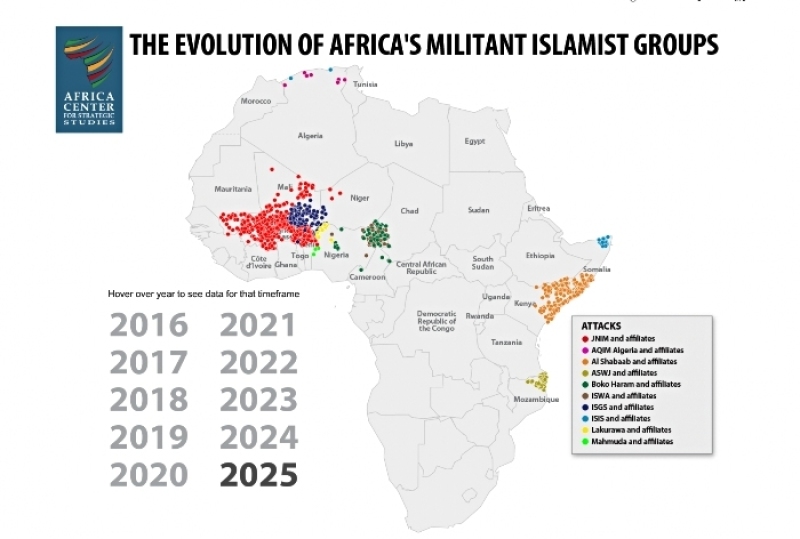
Militant Islamist groups have expanded their presence across Africa, more than doubling the number of fatalities linked to their violent activities in certain regions of the continent.
According to a study by the Africa Center for Strategic Studies (ACSS), In the year ending June 30, ten militant Islamist groups were responsible for the deaths of 22,307 people, most of whom were Christians in West, East, and Central Africa.
The analysis indicates that these groups have increased their violent, lethal tactics since 2023, marking a 60% rise from the period of 2020 to 2022. Nearly half of the fatalities (10,685) in the past year have been in the Sahel, a vast region encompassing ten countries, including Mali, Chad, Nigeria, Burkina Faso, and Cameroon.
“Along with the Lake Chad Basin, these three regions (including Somalia) account for 99% of the militant Islamist-linked fatalities in Africa the past year,” the study states, which also maps the expansion of militant groups’ territorial control across the continent. “Across Africa, an estimated 950,000 square kilometres (367,000 square miles) of populated territories are outside government control due to militant Islamist insurgencies. This is equivalent to the size of Tanzania,” the report notes.
Over the past decade, the study highlights, militant Islamist groups have been responsible for over 150,000 deaths. The groups Al Shabaab in Somalia and the JNIM affiliate in the Sahel have ramped up their operations since 2022, resulting in over 49,000 fatalities in each region over the last ten years. The countries in the Lake Chad Basin have suffered an estimated 39,000 deaths within this timeframe.
The political instability in the Sahel has significantly contributed to the rising death toll linked to militant groups. The region has seen an average of 10,500 deaths annually over the last three years, compared to 4,900 between 2020 and 2023—an increase of nearly seven times since 2019.
“The pace and scale of violence in the Sahel is likely even higher than reported, given that the military juntas that seized power in Mali, Burkina Faso, and Niger have restricted media access,” the study states.
The JNIM network, which has up to 7,000 militants, is responsible for over 80% of fatalities in the Sahel, especially in northern, central, and southern Mali, and southern Burkina Faso. The group now occupies more than half of Burkina Faso.
In Mali, JNIM has released videos allegedly showing abuses by security forces targeting the Fulani community, portraying itself as a defender of marginalized populations. The government forces, meanwhile, have accused the Fulani community of supporting militants, with the study linking 17,700 civilian deaths to government and allied forces.
Increased attacks by Al Shabaab, based in Somalia, have resulted in 6,224 fatalities in 2024 and 2025. The group’s financial resources—primarily derived from extortion, road tolls, and piracy—are estimated at $200 million, rivaling Somalia’s internal revenue.
This report coincides with recent attacks on Christians in a church in Komanda city, eastern Democratic Republic of the Congo, carried out by the Allied Democratic Forces, an affiliate of ISIL/ISIS. The militant group claimed responsibility for the killing of 43 worshippers during a night mass and for burning shops and homes. It also took responsibility for another attack in early July that killed 66 people in Ituri province, near the border with Uganda.



















